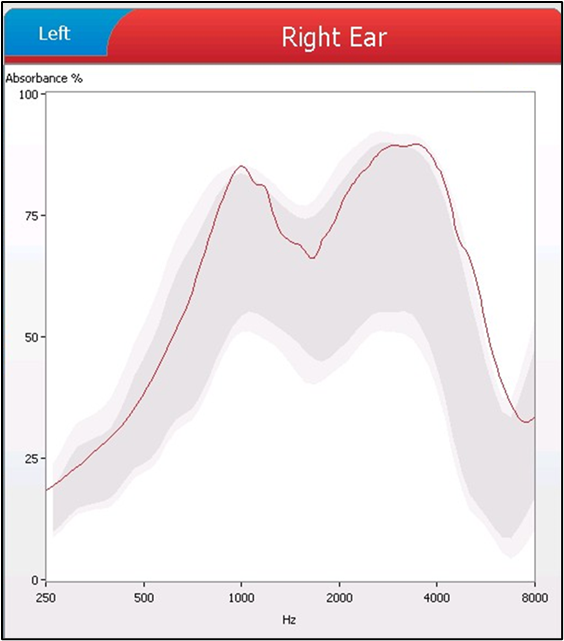Question
What is WideBand Tympanometry?
Answer
WideBand Tympanometry (WBT) is one of a series of middle ear measurements. WideBand Tympanometry is also referred to as WideBand Acoustic Immittance (WAI), which is a more general term for these measurements. WBD and WAI are both used in the research. WAI measurements are obtained using a wideband click or “probe tone” that contains frequencies of 250 to 8000 Hz, as opposed to traditional single frequency probe tones such as 226 or 1000 Hz. Utilizing a WideBand stimulus provides middle ear behavior across the frequency range similar to an audiogram. WAI measurements can be obtained with or without pressurizing the ear canal.
WideBand Tympanometry is measured in the exact same way as single frequency tympanometry. A probe is placed into the ear canal and a hermetic seal is obtained. The patient hears the wideband clicking sound as the pressure in the ear canal is changed from +200 to -400 daPa. The results obtained include familiar measurements of tympanic peak pressure (TPP), ear canal volume (Vea), admittance at peak and tympanogram width (daPa) or gradient (mmho) at single frequency probe tones. In addition to traditional measurements, a graph of middle ear absorbance is obtained.
Middle ear absorbance is the amount of acoustic energy absorbed by or transferred to the middle ear. Absorbance is plotted as percent (%) of acoustic energy that is absorbed across the frequency range. There are specific patterns of absorbance associated with normal middle ears for various age ranges as well as patterns for abnormal middle ears. The image below shows right ear middle ear absorbance for a normal adult middle ear at TPP. The higher the percent, the greater amount of acoustic energy is being absorbed. The shaded area in the background is normative data. The pattern in the normal adult ear is absorbance is greatest in the 1000 to 4000 Hz range.

The normal patterns of absorbance vary according to the age of the patient. There are absorbance normative data for newborns, infants, youth and adults at TPP and ambient pressure.1,3
Middle ear pathologies such as otosclerosis, middle ear effusion and negative middle ear pressure have identifiable patterns of absorbance and provide diagnositic information regarding the status of the middle ear that is not available with traditional single frequency tympanometry. In cases of otosclerosis, the 226 Hz tympanogram is often normal while the absorbance pattern shows a reduction in absorbance in the low frequencies.5 Absorbance has been shown to decrease as the amount of middle ear effusion increases.3 With negative middle ear pressure, comparing absorbance at ambient and absorbance at TPP may indicate the presense of middle ear effusion in additon to negative pressure.5
WideBand Tympanometry is a useful tool to help determine middle ear status and it can provide more clues that aid in differentiating common pathologies than traditional single frequency tympaonmetry, however, it is important to remember that we are not performing this test in a vacuum. Results from WideBand testing need to be viewed in the context of the case history, audiometry, OAEs, and any other testing that was performed. You can learn more about WideBand Tympanometry here, which is now available on the GSI TympStar Pro.
References:
- Aithal S, Aithal V, Kei J, Manuel A. Effect of Negative Middle Ear Pressure and Compensated Pressure on Wideband Absorbance and Otoacoustic Emissions in Children. J Speech Lang Hear Res. 2019 Sep 20;62(9):3516-3530. doi: 10.1044/2019_JSLHR-H-18-0426. Epub 2019 Aug 22. PMID: 31437100.
- Liu, Y., Sanford, C.A., Ellison, J.C., Fitzpatrick, D.F., Gorga, M.P., & Keefe, D.H. (2008). Wideband absorbance tympanometry using pressure sweeps: System development and results on adults with normal hearing. Journal of the Acoustical Society of America, 124(6) 3708-3719.
- Merchant GR, Al-Salim S, Tempero RM, Fitzpatrick D, Neely ST. Improving the Differential Diagnosis of Otitis Media With Effusion Using Wideband Acoustic Immittance. Ear Hear. 2021 Sep/Oct;42(5):1183-1194. doi: 10.1097/AUD.0000000000001037. PMID: 33928915; PMCID: PMC8387322.
- Sanford, C.A., Keefe, D.H., Liu, Y., Fitzpatrick, D.F., McCreery, R.W., Lewis, D.E. & Gorga, M.P. (2009). Sound conduction effects on DPOAE screening outcomes in newborn infants: Test performance of wideband acoustic transfer functions and 1-kHz tympanometry. Ear and Hearing, 30(6), 635-652.
- Seminars in Hearing; Issue 01. Vol 44. February 2023. Assessment of Middle Ear Function Using Wideband Acoustic Immittance: Current Practices and Future Prospects. Guest Editor, Hammam AlMakadma, Ph.D., Au.D.
